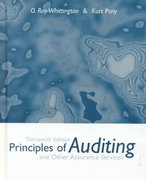Select the best answer for each of the following and explain fully the reason for your selection.
Question:
Select the best answer for each of the following and explain fully the reason for your selection.
a. To determine that all sales have been recorded, the auditors would select a sample of transactions from the
(1) Shipping documents file.
(2) Sales journal.
(3) Accounts receivable subsidiary ledger.
(4) Remittance advices.
b. Which of the following might be detected by an auditors' review of the client's sales cutoff?
(1) Excessive goods returned for credit.
(2) Unrecorded sales discounts.
(3) Lapping of year-end accounts receivable.
(4) Inflated sales for the year.
c. To test the existence assertion for recorded receivables, the auditors would select a sample from the
(1) Sales orders file.
(2) Customer purchase orders.
(3) Accounts receivable subsidiary ledger.
(4) Shipping documents (bills of lading) file.
d. Which assertion relating to sales is most directly addressed when the auditors compare a sample of shipping documents to related sales invoices?
(1) Existence or occurrence.
(2) Completeness.
(3) Rights and obligations.
(4) Presentation and disclosure.
e. Cooper, CPA, is auditing the financial statements of a small rural municipality. The receivable balances represent residents' delinquent real estate taxes. Internal control at the municipality is weak. To determine the existence of the accounts receivable balances at the balance sheet date, Cooper would most likely:
(1) Send positive confirmation requests.
(2) Send negative confirmation requests.
(3) Examine evidence of subsequent cash receipts.
(4) Inspect the internal records such as copies of the tax invoices that were mailed to the residents.
f. Identify the control that is most likely to prevent the concealment of a cash shortage resulting from the improper write-off of a trade account receivable:
(1) Write-offs must be approved by a responsible official after review of credit department recommendations and supporting evidence.
(2) Write-offs must be approved by the accounts receivable department.
(3) Write-offs must be authorized by the shipping department.
(4) Write-offs must be supported by an aging schedule showing that only receivables overdue by several months have been written off.
Step by Step Answer:

Principles Of Auditing And Other Assurance Services
ISBN: 9780072327267
13th Edition
Authors: Ray Whittington, Kurt Pany





